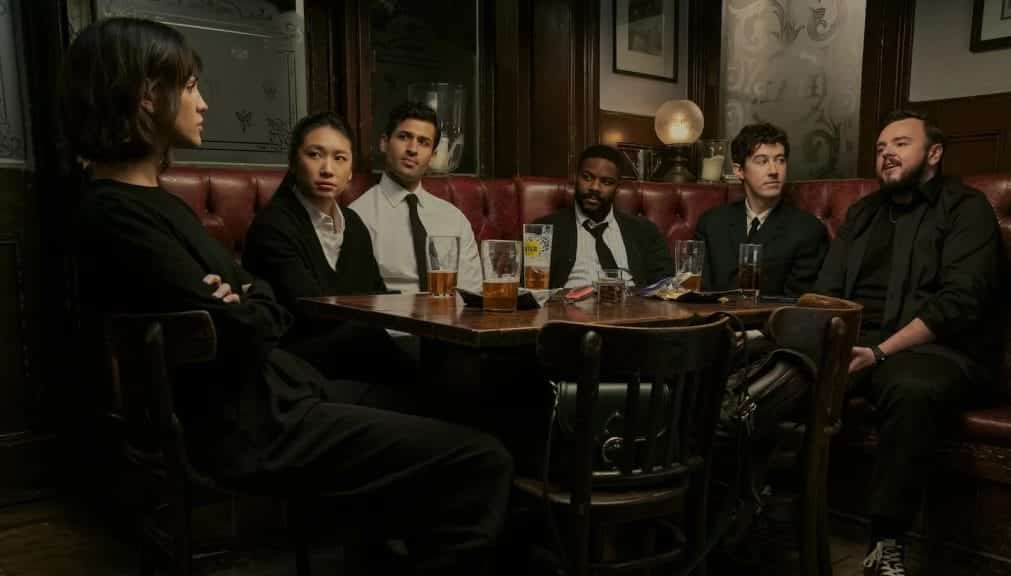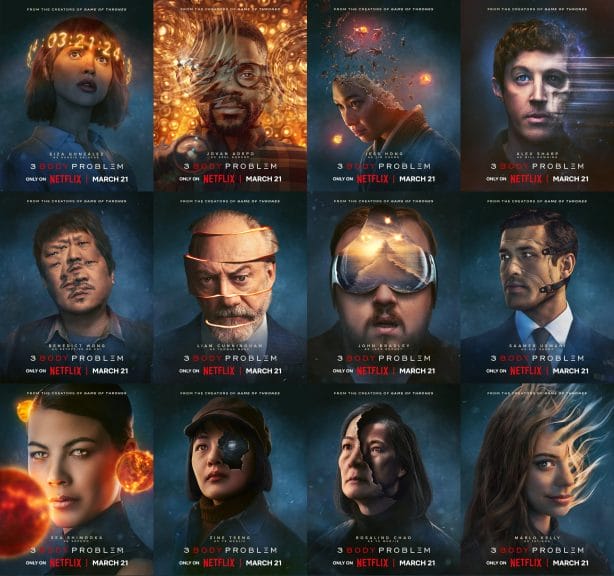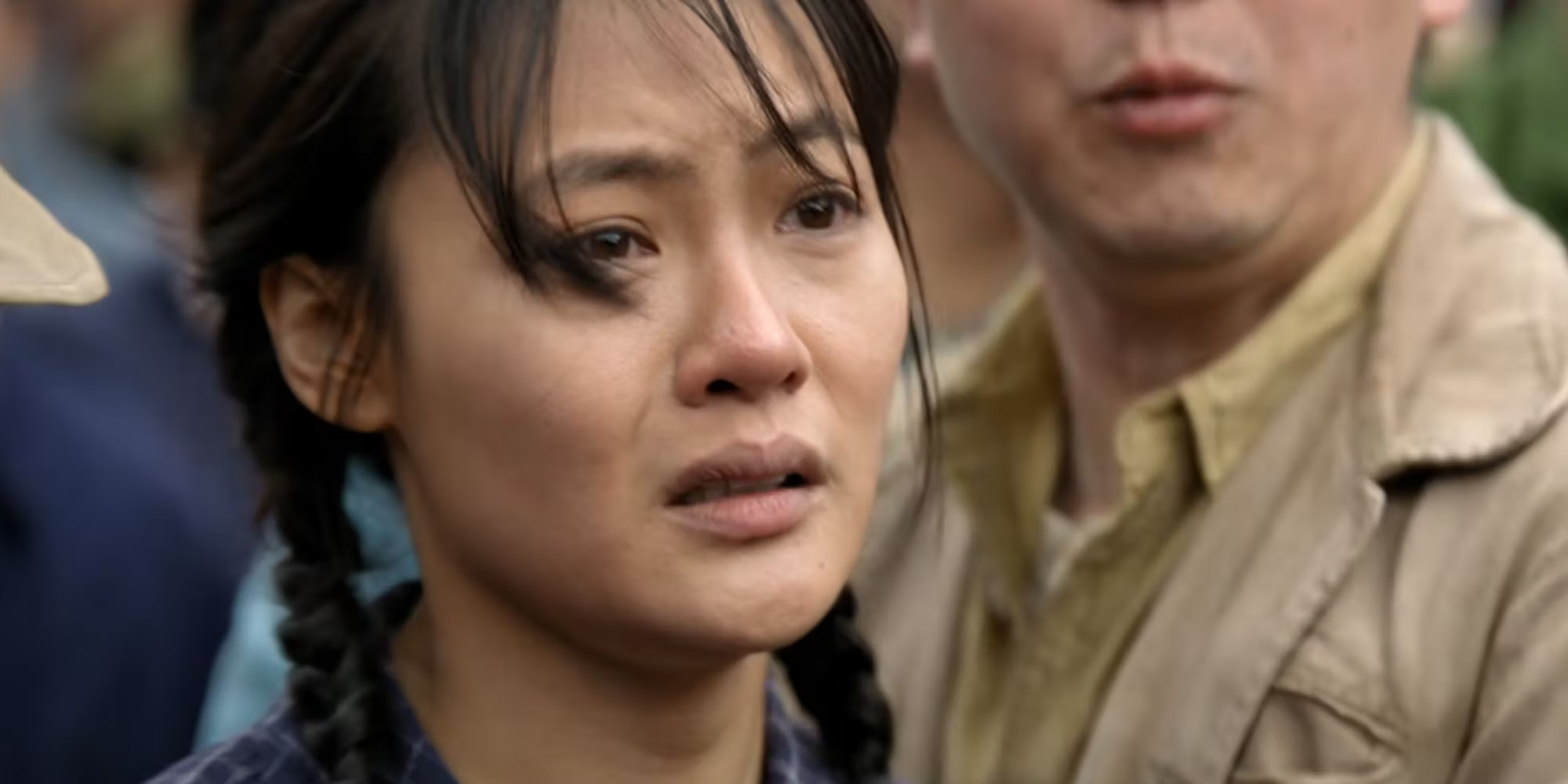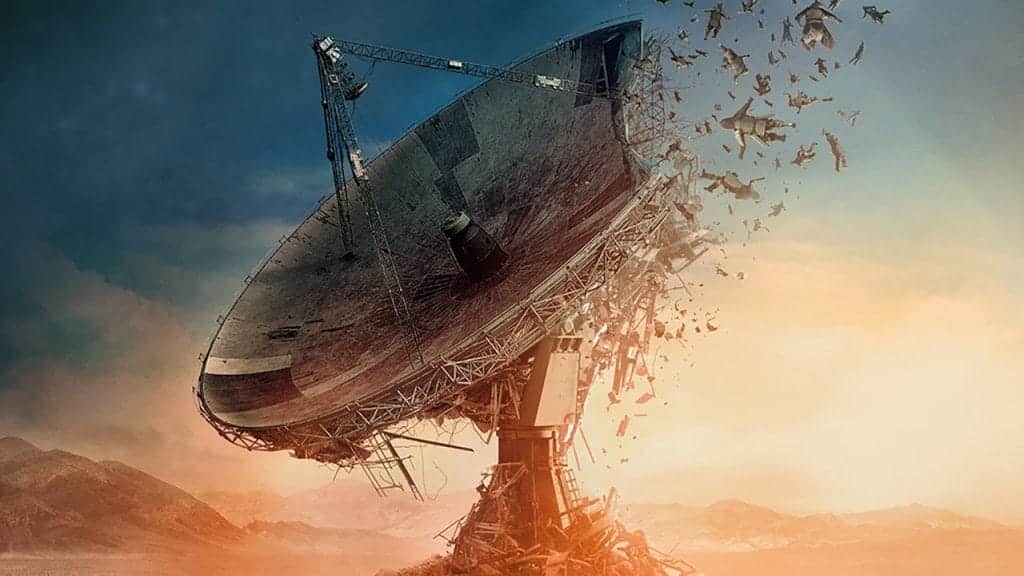The eight-episode series 3 Body Problem premiered on Netflix with the fanfare and subsequent scrutiny of an alien landing. Based on the sci-fi novel by Chinese author Liu Cixin, the series tackles questions concerning humanity, historical and political reverberations, and the limitations of scientific discovery.
The show primarily follows a group of scientists known as the “Oxford Five” who reunite after Vera Ye, their shared mentor from university, commits suicide. Her death seems to coincide with emerging scientific anomalies that Saul Durand, the only student to stay in Vera’s lab, cannot explain. The others undergo their own challenges, including a strange countdown and an even stranger virtual reality software. Meanwhile, a cult-like organization gathers to anticipate an alien race they consider their gods.
As the series progresses, the mystery of who or what is messing with the world’s physics unravels—and it goes all the way back to 1960s Beijing. And soon, the Oxford Five must join their special talents to stop the looming threat to our world.
The Characters of 3 Body Problem and How They Operate
The main cast consists of the Oxford Five:
- Saul Durand: the theoretical physicist who has been noticing strange, unsolvable patterns with Vera;
- Auggie Salazar: the founder of a nanotech company with a sudden glowing countdown plastered to her vision;
- Jin Cheng: a researcher of particle accelerators, is obsessed with progressing through a mysterious virtual reality game;
- Jack Rooney: the comic relief founder of a snacks company, joins Jin when he also receives a VR headset;
- Will Downing: a dissatisfied physics teacher whose world is upended after a cancer diagnosis.

Ye Wenjie, Vera’s mother, reveals herself as the woman who summoned the aliens to avenge the Cultural Revolution’s execution of her father. Her ex-lover, Mike Evans, forms the cult after experiencing his own disillusionment with humanity. Thomas Wade leads a team to investigate this threat.
What works about this ensemble cast is how efficiently the show reveals multiple facets of the mystery simultaneously. Each of the Five grapples with their individual troubles in uniquely characteristic ways. This allows for a natural exposition of dynamics and plot points while maintaining suspense for the revelation of the true plot.
For example, a cult member named Tatiana convinces Auggie that the countdown will kill her if she continues her research. Terrified of this possibility, Auggie shuts down her life’s work with a minute to spare. This decision haunts her and ends up tossing her further into the cosmic mystery than she would’ve liked, juxtaposing her with her best friend Jin, who accepts the mystery with a fixated interest. From here, viewers are primed for her eventual breakdown and refusal to cooperate with the efforts to stop the invasion. And when Wade exploits Auggie’s nanotechnology to slaughter children, her subsequent spiral splits her off from the plot to make room for Will’s fanfare entry.
The Balance of Head and Heart
Will’s journey through cancer forms the emotional nexus of 3 Body Problem. Occupied by this diagnosis, he inhabits a reactionary role for most of the show, reflecting on his relationships. He rues his lack of agency in life and eventually must mourn the loss of his best friend, Jack, to the cult’s operatives, all the while pining after Jin. Auggie and Saul also provide a romantic subplot, but Will’s relationship with Jin, and even his platonic relationships, cement the show as a narrative of humanity just as much as one of science.
3 Body Problem navigates this intersection with the weaving of Will’s storyline through the more jargon-heavy and intellectually demanding parts of the show. He represents something universally accessible. Viewers can latch onto his subplot as a buoy, braving the strict science until the two collide when Will must make a fateful decision. The ultimate experiment to prepare for the future invasion requires a human brain to be sent to the aliens first. Will chooses to sacrifice the little time he has left to help Jin and the intelligence operatives. This pulls him to the forefront and paints him as the ultimate hero, previously unassuming and sidelined by the action.
On the other hand, the death of Jack, the most lighthearted character, is a shock to the show’s tone. This death is not a culmination but a turning point that solidifies the looming threat.
For me, one of the strongest stretches of emotional beats occurs while Jin plays the game. She develops a protective care for a child known as “The Follower.” Through this child, Jin realizes she cannot only try to solve the science of this world’s astronomy but also try to save its people. She embodies the complexity of the show with her insatiable need to discover combined with her deep compassion.
Spectacle and Science Fiction
The arrival of the series on Netflix was an immediate yes for fans of the novel and of the sci-fi genre in general. Promotion for the show featured dazzling lights and cosmic imagery overlaying the main characters (see below).

And the show does not disappoint. The first half of the season is primarily concerned with the virtual reality game that engrosses the players in the harrowing and unpredictable ordeal of another world’s populace. This environment is rendered slightly off, evoking our world’s game animation with the bizarrely realistic technology of this other world. We know this CGI is intentionally imperfect because of another plotline where certain individuals are tortured with a properly rendered countdown plastered to their vision.
Another facet of spectacle involves “alarmingly inventive forms of body horror.” In the virtual reality game, each level ends with the trisolar system annihilating each citizen. Jack and Jin learn that trying to win the game is futile, and they must watch as people are drained of moisture and flattened into skin suits under the sunlight. Later on, Auggie’s nanotech fibers slice through the cult’s tanker, killing everyone onboard. These moments of genuine terror heighten the stakes inexorably.
With every grand, visually stunning (or blood-curdling) spectacle, the show consistently reminds viewers of its true stakes and anticipates a grand conclusion.
Where 3 Body Problem Fails
Despite the poignance and fantastic visuals, 3 Body Problem unfortunately does not maintain a perfect balance throughout. While character investment is certainly there, some characters remain underdeveloped even to the very end. In particular, Auggie and Saul’s romance included slack compared to the strength of Jin’s arc and the emotional beats of Will’s. Auggie does have an interesting relationship with the main plot, as she is the most reluctant and distrusting of even the investigative team, but her actual character falls flatter. Saul doesn’t even have the plot intrigue to balance out the lack of roundedness.
In one scene, their on-off relationship collides with Auggie’s increasing stress. She expresses her frustration with his inability to support her and demands that he grow up. The narrative seems to be on her side here, so the implication is that he has a history of immaturity. While this dynamic suggests something interesting, we know very little about Saul or their relationship to warrant Auggie’s reaction.
Much of the weaker characterization, however, lies in the first few episodes. For the duration of the exposition, prior to the main plot progression, none of the characters stood out much. I attribute this to the show’s insistence on delaying significant reveals until the latter half. That decision is not inherently a poor one; in fact, it serves the pacing rather well. But it also manifests in awkward, vague dialogue that consists of the Five dropping the word “science” in seemingly every other sentence.
Fortunately, the show picks up quickly enough to make up for the slow beginning. Many characters come alive when given something to do. This even includes Jack, who mostly stands in support of Jin’s efforts to finish the game.
Liu Cixin’s The Three-Body Problem
While the reception of the show standing on its own has been largely positive, there have been mixed reviews of it as an adaptation of the source material.
Many celebrate the decision to have an ensemble cast. Zach Kram for The Ringer notes how “characters offer not only more emotional engagement than their book counterparts, but also a greater variety in tone.” The show splits characters from the novel in order to explore multiple perspectives and strengthen investment. This was a logical and successful change in terms of storytelling, but others have more to say about this perspectival shift.
Not only were the characters altered and split, but they were also written with differing ethnicities and backgrounds. This offers a mainstream series some well-needed diversity while broadening the alien threat’s stakes. However, many viewers, particularly those from China, are uncomfortable with the Westernized framing of the story. Much of the present-day plot takes place in the UK, and there is only one Chinese protagonist.
According to Wenhao Ma, despite Liu Cixin’s optimism for the show’s changes, Chinese viewers “accused Netflix of intentionally putting China in a bad light” with its violent portrayal of the Chinese Revolution and lack of present-day action set in China. The Revolution was violent, and this depiction was needed to kickstart Ye Wenjie’s character arc. However, since that is the only time we experience the country, there does seem to be some intention of protagonizing the west.
However, though its universality may not be ideal for all, as an adaptation, the show certainly encourages Western viewers to read the source material for the full picture.

Overall Thoughts
Holistically, this show is a fantastic exploration of human response to something completely inhuman. There are shortcomings, but none are distracting. The show is a bit slow to pick up, but the primary substance more than makes up for the beginning. As the narrative unfolds, the suspense builds and culminates in the final experiment—an experiment that strikes the balance between head and heart, cosmic calculations, and human love melded together for a single launch. Will’s brain carries fears and possibilities out into the unknown and us with it.
And the experiment fails. And humanity lives on as it always will, literally and thematically setting up for a continuation.
At the intersection of science and sentiment, there is hope.













